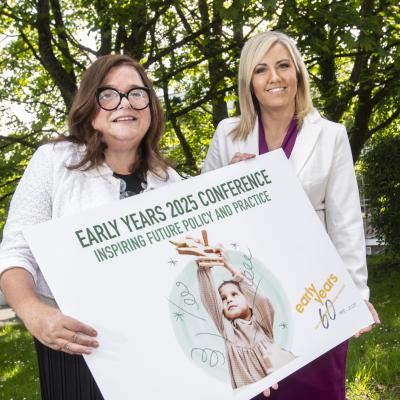Family mental health support under spotlight in Belfast
Parental mental illness and, or substance use problems, are major public health issues as they may negatively impact children. Conversely, children’s experiences and difficulties may impact parents’ mental health.
In 2012 the ‘Think Family NI’ initiative’ was developed by the Health and Social Care Board alongside the Children and Young People’s Strategic Partnership and was implemented within a regional action plan as part of a family based model approach to care, known as ‘Family Focused Practice’ (FFP).
The aim of the Think Family NI initiative is to enhance greater partnership working between statutory agencies and organisations working with children and young people, and those working with adults to improve outcomes for family members with mental health issues, their parents and carers by establishing a ‘Think Child, Think Parent, Think Family’ approach to planning and delivery of services.
Mary Donaghy, Regional Think Family Lead at the Health and Social Care Board commented: “The Think Family NI initiative was introduced to help staff understand the impact parental mental health issues can have upon others within the family, and to raise the importance of getting in early and quickly to identify parent and family needs, and parent and family supports.
“This holistic and lifespan approach using The Family Model raises the profile of the intergenerational issues parental mental health can have upon family members.”
In 2016 the Health and Social Care Board commissioned Queen’s University Belfast in conjunction with Ulster University to conduct the first regional study to examine Health and Social Care (HSC) professionals’ FFP in adult mental health and children’s services across Northern Ireland.
Overall, the report findings indicate that professionals participating in the current research study and who appear representative of the wider HSC adult mental health and children’s social care workforce report low levels of FFP.
The report also found service users conveyed the need for recognition of parental status within services and the importance of addressing parenting issues along with mental illness and/or substance use problems, as part of service delivery.
Service users also highlighted the stress of parental mental illness on the wider family and the need for greater family supports.
One service user who took part in the study reported: “when I am better, everything is better. They are better, my husband is happier, the house is better, you know, everything is better whenever I am better.
“So everything has a knock on effect. Even if children’s services isn’t involved with adult services, getting the right adult services in place can help make everything better.”
Sean Holland, Chief Social Work Officer, Office of Social Services in the Department of Health, said: “I welcome this important study which will give health and social services a baseline of family focussed practice on which to improve from.
“Children and family members have been providing feedback about the benefits of family focused practice in their recovery journey they have shared with parents and family members. It is important that we note and develop the opportunities and initiatives they have identified.
“The outcome of the study will help develop and embed family focused practices when parents suffer from mental health issues.”
Dr Anne Grant, Researcher at the School of Nursing and Midwifery at Queen’s University explained: “The knowledge generated from the research will contribute to the development of an integrated policy, practice and research strategy, including performance indicators to move systems change forward in Northern Ireland and internationally.
“It has also enabled benchmarking and helped to shape future implementation strategies, including guiding the development of future systems change initiatives, given the global need to reduce intergenerational impact of mental illness on families.”
Mary Donaghy continued: “These findings will help us to better understand the differences in practice across the professional disciplines and the key recommendations will shape future policy, practice, education and research which will ultimately enable us to improve the care that is offered to families with mental health issues across Northern Ireland.”
The report was launched in Riddel Hall at Queen’s University Belfast at an event organised by Dr Anne Grant, at the School of Nursing and Midwifery, in partnership with Mary Donaghy, Think Family NI, at the Health and Social Care Board.
There are six international speakers, including Professor Joanne Nicholson, USA, and Sydney’s Dr Adrian Falkov, author of The Family Model Handbook, who will share his expertise in implementing an integrated approach to supporting mentally ill parents and their children.

Health and Social Care Board
12-22 Linenhall Street
Belfast
BT2 8BS
United Kingdom




